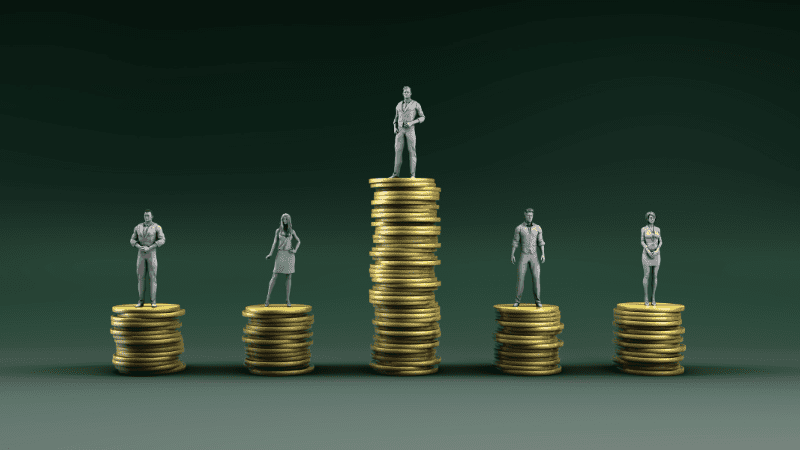Why Low Income Is So Despised in Society
Even if we are not always aware of it, a low income is not particularly well regarded socially. And this is despite the fact that low to medium salaries are actually the norm. A paradox that we will take a closer look at in this article.
That and why a low income can actually be okay as long as it's right for you.
There is some substance to this topic. Here is the overview of the article:
Origin of low income disdain
From a young age, we are conditioned to admire people with high incomes. People with low incomes tend to be held in low esteem, often ridiculed or even despised.
Evolutionary-biologically this behavior makes sense, because who had many resources, had a good chance to keep himself and his close environment alive. If one had however only little, that could often mean that one had to lead a bad and/or difficult life and with worse external circumstances possibly its life lost, or it not managed to bring through its children. Also, the community benefited little from people with little means.
At least that was the state of affairs in the past, but today it usually looks different.
Today's social and financial circumstances
The majority of people are still at the lower end of prosperity. While this can certainly be a problem in developing countries and can (and does) cost lives, in the Western world it is increasingly irrelevant whether you earn a lot or not.
Before pitchforks and torches are drawn, I would like to clarify this a little:
Of course, there are also people in the Western world who live below the subsistence level. Far too many, in fact. And that is a problem.
But:
Most jobs now provide an income that is sufficient for a decent life. The general prosperity has increased immensely in the last 70 years.
Please don't resort to chasing me around town just yet.
FACT (UN REPORT 2015)
Of the 23.3 % of people recorded as undernourished between 1990 and 1992, only 12.9 % remain today. North Africa has even reached the goal of halving extreme poverty five years before the 2010 deadline. Today, 1 % of people still live on less than $1.25 per day. This figure is down from 5 % in 1990.
What I mean is that our current social constructs and innovation have ensured that a considerable degree of prosperity has reached even the low-income stratum of the population.
As a result, there is usually more food than is necessary, medical care that ensures survival for most health problems, and usually some financial surplus that can be used for luxuries.
This luxury can take many forms. Some examples are:
- Vacations - even if they are less frequent and less extravagant than for high-income individuals
- Intoxicants - alcohol, tobacco, coffee, etc.
- Entertainment - streaming services, cinema, theater, etc.
- Hobbies - such as playing an instrument, playing a sport, club membership, and more.
So, in most cases, it would be quite possible to be happy and, above all, respected with a low income. But why does this often not work in practice?
The answer may be flickering through your mind right now:
Because we have not discarded the thought patterns that used to benefit us but are now actually obsolete.
Why we haven't done that yet?
On the one hand, because humans (from an evolutionary point of view) are only developing extremely slowly. So slowly, in fact, that it is almost perceived as a standstill compared to the rapid technical progress we are making.
On the other hand - and this is much more problematic - because we have been socially conditioned to want more and more in order to keep our well-oiled consumer industry running. The permanent advertising that pelts us everywhere in everyday life is the perfected tool for this. Did you know that we per day up to 10,000 advertisements are exposed? Sounds completely dysfunctional - and it is. By the way, it is just as dysfunctional in a system with limited resources to strive for unlimited growth, but let's leave that for another article.
Anyway, another problem is... drum roll... social media. No, I don't consider social media an enemy, but it's undeniable that it has evolved into a completely twisted direction where 99% of people compare themselves to the super-rich 1%.

We frantically try to present our own lives in a completely embellished way. Reflection seems to have set in here for some time and we have started to draw attention to the staging on Instagram and the like, which we should be very happy about and in which direction we should urgently push further.
In any case, these two circumstances have an extremely sad consequence:
We still believe that we are not enough and have not achieved enough. Yet we as a species have actually taken the wonderful step of no longer necessarily having to strive for more. And yet we do.
(As I said, there are still many people we need to reach out to and it's beyond me why this is so slow).
Advantages of low income
You've probably already guessed that I'm going to come around the corner with some of the benefits of a low income as well, right? Well, let's see.
Compared to the disadvantages (lower financial possibilities - especially in terms of the amount of luxuries), the advantages are not quite so obvious. But they are there.
And they are actually very tempting. Let's look at the biggest advantage in advance:
Low income is easier to achieve
If with a comparatively low income, already all basic needs and even a certain amount of luxury can be covered, it takes relatively little effort to achieve this.
You then have the wonderful freedom to choose the profession you really want to pursue and not the one that brings in the most money.
It is not always necessary to acquire new customers in order to chase the big "more".
More time for life

Coupled with more and more innovations, it inevitably follows from the previous point that it becomes easier and easier to maintain the status quo of prosperity. This means that over time you will have to work fewer and fewer hours to maintain it. This frees up time to pursue creative projects and perhaps innovate yourself. You can also pursue charitable causes, meet friends and family, or just sit under a tree and stare into the distance.
A nice contrast to the countless hours of overtime that many of us work to pay off the new TV, which has 10cm more screen diagonal than the old one. Or so that it's no longer a BMW 5 series that you park in the underground garage at the store at 7:00 in the morning and drive home again at 9:00 in the evening, but now a Porsche 911.
Again, I don't want to be misunderstood, if you enjoy your work, overtime is perfectly fine in my opinion and a logical consequence. And if the things you work on fulfill you, that's definitely fine too. But, if one catches itself that one shortly after the recent purchase, after the next thing lechzt, one should go something in itself.
More appreciation for your possessions
By tending to make your material possessions last longer, you'll automatically value them more. Just like the lower costs of use:
A shirt for 50€ that you wear 500 times over the years is effectively cheaper than a shirt for 25€ that you wear only 100 times.
At the beginning, it may not be very insightful for us why we can't also appreciate when we have a lot of something. And that's right: you can also have a lot and appreciate these things.
In theory.
In practice, however, it usually looks like that when we have abundance, we have little appreciation for anything.
But is it not just any shirt that you take out of the closet, but THE shirt, or at least anya shirt, you will automatically appreciate it more.
It behaves the same way, with purchases of any kind:
- If you had to save up for your new smartphone for a while, you'll be the significantly more caring for your daily companion.
- If children have one special toy, they will occupy themselves with it. If, on the other hand, they have hundreds, everything usually ends up in the corner after a few minutes and is no longer paid attention to.
- etc.
So a lower income not only has the potential to save the planet, but also your psyche and last but not least your lifetime reserves. So you could be happier than someone who spends himself completely for a higher income.
How we can give low income more tolerance

The motto is:
More recognition for "normal" jobs
It's ironic that we often look down on low-paying jobs, even though most of the population is doing just that kind of job. We should start to realize this more often. As well as the fact that these jobs are extremely important to the functioning of our society. Especially (but not exclusively) manual jobs, often don't get the appreciation they deserve anymore. Maybe you're not always in the mood or you don't really dare, but a few appreciative words are actually always in there.
If something along the lines of "I don't hear nice words in my job either." just popped into your head, that's the best evidence you have of this sad fact - and that's when you should start giving others credit for their work.
A nice and yet very simple way to straighten out our society a bit.
How to live well on a low income
Minimalism
No, I don't mean get rid of 80% of your possessions.
(Even though this can be very liberating, as countless people have found.)
But the simple fact is that we accumulate far too many things. Often without bringing any benefit. This is connected with financial expenditure, which can make our life expensive. If we manage to reduce ourselves here, it can result in having more money at our disposal with the same "low" income.
I myself am regularly amazed at how much more money has stuck around since I significantly reduced my possessions. And it also brings inner peace.
Lukas has, by the way, been on the road for much longer and is also much more minimalist than I am.
Budget expenses and keep records
I know this point is not very sexy, but it is important.
Unfortunately, our education system fails to teach us how to handle money well. It is often said that it is the responsibility of the parents. But if one's own parents were also unable to enjoy a financial education, the picture looks bleak. One could of course try to reject the blame of another generation, which is futile and brings nothing at all (this reminds me of a talk by Alan Watts that Lukas discussed in an article).
So it is necessary to improve your financial skills yourself. The simplest method for this is simple budgeting.
There are countless methods of keeping a book (notebook, app, Excel spreadsheet, etc.). Some are very convenient to use.
If you don't want to do this, however, you should definitely set up an overview of your monthly cost items, because:
At the end of the day, it's a simple equation to strive for:
Revenue > Expenses
Unconditional basic income

If you also saw this point coming, it's getting a little scary.
In any case: The idea of an unconditional basic income is old, but has not really caught on anywhere. Although the studies on the subject are very promising.
The common opinion that people who receive it degenerate into drunks and day thieves has not proven true. On the contrary. Expenditure on intoxicants actually decreased among participants in the trial series.
Moreover, an unconditional basic income would replace various social benefits that already exist and cost the state money. So it would simply be a new use of these funds.
However, the additional expense that would be incurred is still worth it. Through the increased capacities for innovation of the beneficiaries and the fact that the money flows back into consumption and keeps the economy going. We will go into this topic in more detail in another article.
At any rate, we don't have this solution yet. But maybe it will come sooner than we think.
I hope I was able to give you a proper overview of this topic. As you can see, things are not that simple, but they are definitely not unchangeable either. Have the courage to stand up for yourself if you live your life with a rather low salary on average.
And almost more importantly, don't judge people who have low incomes, because that's irrational - and mean.
Note: my point in writing this article is not to say that many jobs don't deserve higher salaries, but simply that money isn't everything and we often have enough for a satisfied life.
Did you like this article? You can let us inform you about new articles:







